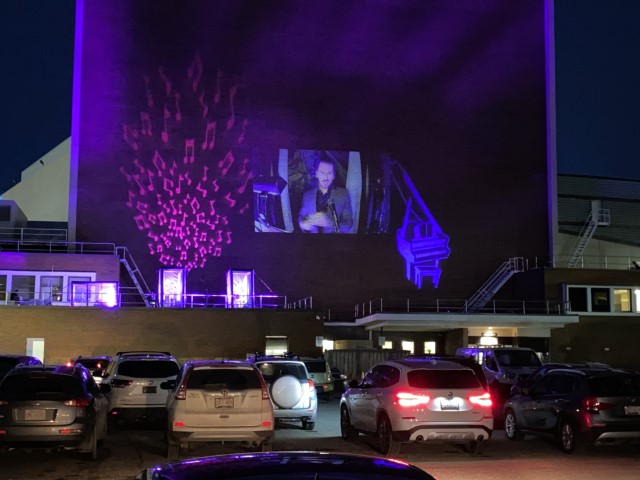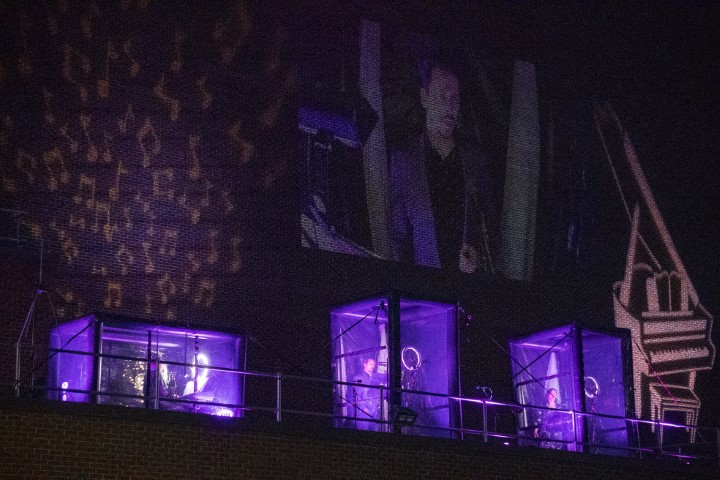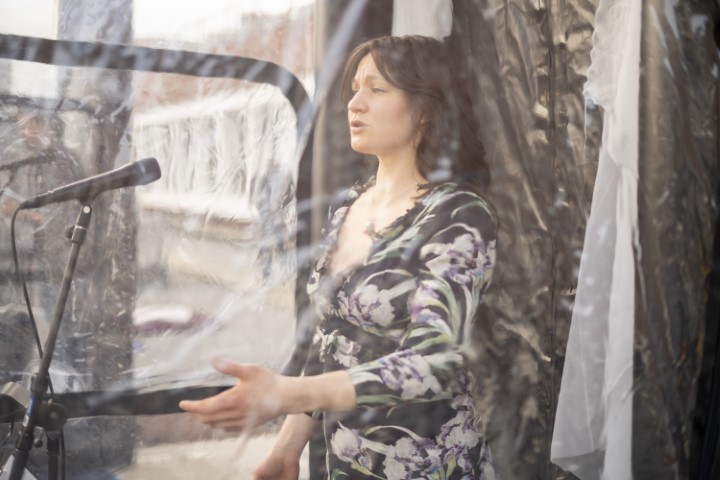To my readers: if you need to get out of the friendzone – take them to the opera

By Sarah El-Ezaby
Just this last March I had the pleasure of going to Edmonton Opera’s third Drive-In Opera: Songs of Spring. It was an enjoyable performance overall, with soprano Whitney Sloan, and baritone Tyler Fitzgerald singing solos and duets about spring love. But looking back that evening has become a treasured memory not necessarily because of the performance, but because of who I had sitting in the car with me listening to French, German, Russian and English love songs over an FM radio station at twilight.
Naively, I invited my friend Daniel to the performance, thinking we were nothing more than such. And even though nothing strictly romantic happened, the drive-in was just one more stop on the road we’re on now. Not dating, but not just friends. To my readers, if you need to get out of the friendzone – take them to the opera.
That evening gave him an all-access pass to the inner workings of my mind on a subject I’m more than passionate about, opera. I’ve loved music my whole life and until recently competed in classical music voice competitions as a heavy lyric soprano. When I do sing, I love the kind of music that is larger than life, more beautiful than imaginable, but rooted in reality.
Given the opportunity to cover the drive-in opera, I jumped at the chance, and immediately thought to invite Daniel, a newcomer to classical music, because he appreciated my passion for it. Simple questions of his about opera have turned into thirty minute excitedly fueled rants, where I forget how to make things make sense to someone new and connect entirely way too many ideas for anyone to keep up with. I hear it’s entertaining when it happens.
I invited him with me to the opera thinking he would enjoy seeing a little glimpse of the racetrack my mind runs on when I talk about music, and brushed aside the fact that it was a romantic concert. Were we really just two friends going to a recital of love songs in the lusty month of March? Probably not. But we told ourselves we were.
Usually when I go to the opera, getting ready is an hour long affair and what I wear is something worth stewing over the week up until the performance. Ha. Not this time. No siree. My week had been one of the busiest I’d had all semester, and so I left the gown and heels at home in favour of some casual slacks, a blouse and earrings. At the very least I was wearing makeup.
One of the first things I told Daniel after I invited him was to “leave the tie at home.” Me from a year and a half ago would have cringed. Who would turn down an opportunity to see a dashing young man in a suit? Apparently me in a pandemic.
Had I not had the honour of such amazing company, I easily could have sported three-day old leggings and a hoodie. Only the ticket clerk would have been the wiser.
Nevertheless, I printed off our tickets, washed the car and went to pick him up.
I laughed a little and smiled when I saw that although he did leave his suit at home, he was wearing a tartan plaid button down shirt tucked in. The part of me that loves to dress up for the opera does so for fun, but also out of respect for the art. He felt that same sense of respect too.
Once we went through the ticket booth, a car toll station in between the Jubilee and the University’s Lister Centre residence, I drove into the parking lot and waited for an usher to tell me to come forward. Usually an usher takes you to your seats – well this wasn’t much different as these ushers in bright orange vests and reflective wands organized car traffic so that every other parking space was empty.

All vehicles faced the ‘stage,’ a brick wall with a projector set up for PowerPoint slides, and a live stream of the singers’ faces – contained within their plastic gazebo-like compartments on top of the Jubilee roof, weather proofed for sun, rain or snow. They had video cameras and microphones within the gazebos ready to transmit their live audio to a local FM frequency the audience tuned to.
The usher led my vehicle to the back row and would have gotten me to back up into the spot, but you see I panicked. My mind went, “Why back up when you could just drive in?” Ignoring the fact that we would be facing the fence, I started turning my wheel out to pull into the spot and would have fully done it before Daniel pointed out my flawed plan.
Recognizing the panic on my face, the usher moved away from the back row and had me pull into a spot second row from the back, guiding me with the reflective wands until my SUV was in park. I felt like a kindergartener who needed their hand held, and prayed not too many cars behind me were paying attention.
The program had an assortment of music from various composers, languages, and eras, but because of its focus on love, I was really surprised not to see any Italian arias listed. Most classical voice music is written in French, German, Italian or Russian, and each language even within an era has its own characteristics. Italian Romantic music is one of my favourites because of the verismo trend Puccini started. Stemming from the Italian word for true (vero), verismo is about bringing realism to the plot, characters, and music and hitting it melodrama. When these elements feel relatable audiences get swooped up and taken away once the tragedy hits. Operas employing this technique leave me a sobbing mess at the end of night, just the way I like it. My favourite operas and classical pieces are the ones that make me feel something in a big way.
I was missing that a little at the Edmonton Opera, the relatability of the music. I think this was largely to do with not having the English translation of the libretti (lyrics), depriving me of the context of a singer’s artistic choices. When you attend an opera, the libretto’s translations are projected in time with the music above the main stage. I was really hoping the English translations would be projected onto the large brick wall the cars faced, but that wasn’t the case. A lot of affectivity was missed because of this.
Had Daniel been able to see the meaning of Gustave Charpentiere’s Depuis le jour, the second song in the program, who knows how much more he’d be longing for love as Sloan sang about a transcendent kind of happiness new love brings. The libretto paired with the ascending line towards the end sounds like freedom, like love, and the magical trills of the orchestra, take the voice to a higher level, another realm. But you don’t know that if you don’t know the words.

To be fair, a brief overview of the songs was given three at a time, almost like a song cycle. But by the time the second or third song came around, I couldn’t remember much about the context of the piece.
Sitting on our own in the quiet of my car was intimate, even though nothing strictly romantic happened. Imagine two people simply sitting to listen to a program on spring love – definitely not a friendly activity per se. It was really quite personal as I answered Daniel’s questions in a hushed tone above the music, exposing my inner thoughts, but also revealing “Sarah the singer” in action. Every now and then, particularly when I tutted, sighed or smiled at the performance, I felt his gaze on me. Reading my reactions were probably just as helpful as any audible dialogue I could give. Or is that just what I told myself in the moment?
When the performers spoke about the context behind songs like Schubert’s Meine Rose, where the character’s grief from losing her partner is so strong she imagines being able to pour her soul out to revive him like water to a rose, the energy in the car grew tense, filled with a kind of nervousness. I asked myself: we’re just friends right? Sitting there hearing about the all-consuming nature of love, who wouldn’t want to be? That evening with a little night music, my sun-roof was open, the stars were out, and we weren’t in love, but hearing the performers sing about the possessiveness of it, well maybe that made us wish we were.
The concert ended on a light note with a duet from The Magic Flute, but my favourite of the night was most definitely Whitney Sloan’s rendition of Rachmaninov’s 1902 song Zdes’ khorosho (How Beautiful it is Here), op.21 No.7, where her long legato lines across breath marks likened love to a kind of peacefulness found in Heaven.
We left the lot in good time, playing Zdes’ khorosho on repeat as I explained why it made me feel the way I love to at the opera, like it’s everything. Sharing that feeling with someone else is priceless, and so I implore you opera connoisseurs to show the people in your life exactly what music does for you.


